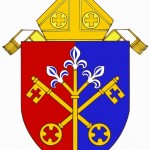 In January 2012, I wrote about the growing trend among Europeans to request that they be “unbaptized”—that is, not content to merely stop attending Mass on Sunday, they wanted to be formally removed from the rolls at their local Catholic parish, and to have any record of their baptism expunged. They wanted to be “unbaptized.”
In January 2012, I wrote about the growing trend among Europeans to request that they be “unbaptized”—that is, not content to merely stop attending Mass on Sunday, they wanted to be formally removed from the rolls at their local Catholic parish, and to have any record of their baptism expunged. They wanted to be “unbaptized.”
Of course, that’s not possible. As I wrote before, the Sacrament of Baptism leaves an indelible mark on the soul, and formal resignation from the Church does not obliterate that mark. Apart from that, however, a declaration of “unbaptism” has effects in civil society.
In Germany, for example, adherents of any religion—whether Catholic, Protestant or Jewish—pay a “religious tax” which is equal to 8 or 9 percent of their total tax bill. By disavowing their belief in the faith, German citizens can hope to reap financial benefits, if not eternal benefits. Reasons for the departure of more than 181,000 Germans from organized religion in the year 2010 include a loss of faith, disagreement with Church policy, disappointment following the clergy abuse scandal, and potential tax benefits.
Well, the Roman Catholic bishops of Germany have reacted: Last week the German bishops issued a decree declaring the practice of “unbaptism” a “serious lapse” and imposing a long list of church activities from which the defectors will be excluded. “Unbaptized” persons cannot, for example,
- receive the sacraments, except for a religious blessing at the time of death;
- have a religious funeral, or be interred in a Catholic cemetery;
- work in the church or its institutions, such as schools and hospitals;
- be active in church-sponsored associations such as charity groups or choirs; or
- be godparents for Catholic children.
Additionally, they must get a bishop’s permission to marry a Catholic in a church ceremony.
In reporting the story, Reuters news agency treated the bishops’ stance as an attempt to hold onto their income, and to punish those who weasel out of paying the government-imposed church tax. (Here in America, the practice of government assessing taxes to support churches is unfamiliar; but in Germany, Church taxes brought in about 5 billion Euros, or$6.5 billion, for the Roman Catholic Church in 2010.)
In fact, though, there is no new information here. It has been the constant practice of the Catholic Church to restrict reception of the Sacraments to its members—with baptism, the sacrament of initiation, being the gateway to membership in the Body of Christ.
The German bishops regretted that the consequences of leaving the church had not been clearly spelled out in the past. The bishops’ decree makes clear that one cannot “partly leave” the Church. “It is not possible,” says the statement, “to separate the spiritual community of the Church from the institutional Church.”
For more information on the “de-baptism” phenomenon throughout Europe, read this.
For Reuters’ report, which includes some statistics on the exodus and on Church membership in general, read this.











